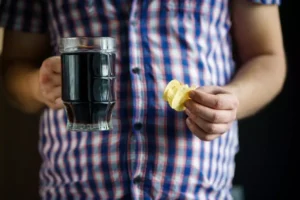
Moreover, heavy drinking in a fasting state can cause hypoglycemia and ultimately increase diabetics’ risk of death from noncardiovascular causes. Although prevalence rates were typically around50%, one study reported a prevalence rate of only about 20%;however, this was a qualitative study examining how university students definebinge drinking (Clinkinbeard and Johnson,2013). As such, participants were not directly asked whether they hadexperienced an alcohol-induced blackout, but rather participants were asked todescribe binge drinking and then researchers categorized whether the responsesdescribed alcohol-induced blackouts. In addition to their prevalence rate of54%, Barnett and colleagues (2014)found that college students reported experiencing an alcohol-induced blackoutnearly once every five drinking weeks during the first year of college. Thus,alcohol-induced blackouts are not only common among those who consume alcohol,but also recur over time. This study provides evidence of a longitudinal association between alcohol-induced blackouts and symptoms of depression.

Diabetes and Alcohol Consumption Dos and Don’ts
- In a subsequent study, White and colleagues (2004) interviewed 50 undergraduate students, all of whom had experienced at least one blackout, to gather more information about the factors related to blackouts.
- These authors recruited 108 college students, half of whom had experienced at least one fragmentary blackout in the previous year.
- Blackouts are much more common among social drinkers than previously assumed and should be viewed as a potential consequence of acute intoxication regardless of age or whether one is clinically dependent upon alcohol.
- This may be due to the physiological differences that affect alcohol distribution and metabolism.
Binge drinking can quickly develop into a blackout situation, and people sometimes view blacking out as a sign of having fun. However, alcohol blackouts are a serious threat to a person’s health and safety. They increase the risk of other dangerous activities and consequences, such as injury, sexual assault, violence and alcohol poisoning. Alcohol intake can affect fertility in men and women, so if you are trying for a baby it is important to cut back. For pregnant women the safest is not to drink alcohol at all during pregnancy.

Who is Most At Risk for Blacking Out?
Learn to recognize your body’s signs of low blood sugar so that you can act accordingly. That’s true for all drinkers — but it’s especially true if you have diabetes. How fast alcohol is absorbed depends on how much alcohol is in the drink, the presence of food in the stomach, and other factors, such as body weight and metabolism.
How Does Alcohol Use Impact Diabetes?
Alcohol (also called ethanol) is processed in the body through a series of steps. When you drink an alcoholic beverage, the alcohol in that drink is rapidly absorbed from can diabetics get drunk the stomach and small intestines into the bloodstream. Additionally, alcohol may interact with diabetes medications, further complicating blood sugar management.
What happens to the body during a blackout?
Nearly 77% of the incomingfreshmen reported drinking alcohol in a pre-meditated, intentional mannerwith the goal of becoming intoxicated. Compared to those who did not drinkto get drunk, individuals who reported drinking to get drunk were morelikely to experience an alcohol-induced blackout. Further, consistent withthe prepartying and drinking games studies described previously (LaBrie et al., 2011; Ray et al., 2014; Wahl et al., 2013), individuals who reported drinking to getdrunk were also more likely to have prepartied and participated in drinkinggames. Although alcohol-induced blackouts were previously thought to occur only inindividuals who were alcohol dependent (Jellinek,1946), we now know that blackouts are quite common among healthy youngadults.
1. Sample 1 Concurrent Model
In addition to suppressing the output from pyramidal cells, alcohol has several other effects on hippocampal function. For instance, alcohol severely disrupts the ability of neurons to establish long-lasting, heightened responsiveness to signals from other cells (Bliss and Collinridge 1993). In recent work with awake, freely behaving rats, White and Best (2000) showed that alcohol profoundly suppresses the activity of pyramidal cells in region CA1. The researchers allowed the rats to forage for food for 15 minutes in a symmetric, Y-shaped maze and measured the animals’ hippocampal activity using tiny wires (i.e., microelectrodes) implanted in their brains. The activity—which corresponds to the middle portion of the lower left arm of the maze—is shown before alcohol administration (A), 45 to 60 minutes after alcohol administration (B), and 7 hours after alcohol administration (C).
Unlike en bloc blackouts, fragmentary blackouts involve partial blocking of memory formation for events that occurred while the person was intoxicated. Goodwin and colleagues (1969a) reported that subjects experiencing fragmentary blackouts often become aware that they are missing pieces of events only after being reminded that the events occurred. Interestingly, these reminders trigger at least some recall of the initially missing information.

Alcohol’s Impact on Blood Sugar

In all five patients, the alcohol-induced hypoglycemia induced neurological changes, such as incontinence, inability to follow simple commands, perseveration,4 disorientation, and impairment of recent memory. In three patients, those changes did not reverse, even after months or years. The two other patients died as a result of complications indirectly related to their hypoglycemia-induced neurological changes.
- Contact us today to learn more about alcohol addiction treatment programs that can work well for your needs.
- If a person believes that they are experiencing psychogenic blackouts, a doctor may refer them to a neurologist, who may be able to diagnose psychogenic blackouts by ruling out other causes.
- Subsequent research provided additional evidence suggesting a link between blackouts and rapidly rising BACs.
- However, what may be lesser known to nondiabetics is alcohol’s effects on insulin production, blood sugar or glucose levels, and its negative interaction with some diabetes medications.